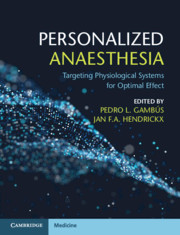Book contents
- Personalized Anaesthesia
- Personalized Anaesthesia
- Copyright page
- Contents
- Contributors
- Foreword
- Introduction
- Section 1 Basic Principles
- Section 2 Targeting Effects
- 7 Hypnotic Effect: Inducing Unconsciousness and Emergence from Anaesthesia
- 8 Analgesia: Effects on Response to Nociceptive Stimulation
- 9 Personalized Sedation and Analgesia
- 10 Respiratory Depression
- 11 Immobility
- 12 Effects on Brain Function
- 13 Targeted and Individualized Perioperative Medicine for Cognitive Dysfunction
- 14 Cardiac and Haemodynamic Function
- 15 Effects of Anaesthesia on Thermoregulation
- 16 Effects of Perioperative Management on Kidney Function
- 17 Effects on Liver Function
- 18 Effects on Fluid Balance
- 19 Ventilation during General Anaesthesia
- 20 Epilogue: Artificial Intelligence Methods
- Index
- References
13 - Targeted and Individualized Perioperative Medicine for Cognitive Dysfunction
from Section 2 - Targeting Effects
Published online by Cambridge University Press: 03 December 2019
- Personalized Anaesthesia
- Personalized Anaesthesia
- Copyright page
- Contents
- Contributors
- Foreword
- Introduction
- Section 1 Basic Principles
- Section 2 Targeting Effects
- 7 Hypnotic Effect: Inducing Unconsciousness and Emergence from Anaesthesia
- 8 Analgesia: Effects on Response to Nociceptive Stimulation
- 9 Personalized Sedation and Analgesia
- 10 Respiratory Depression
- 11 Immobility
- 12 Effects on Brain Function
- 13 Targeted and Individualized Perioperative Medicine for Cognitive Dysfunction
- 14 Cardiac and Haemodynamic Function
- 15 Effects of Anaesthesia on Thermoregulation
- 16 Effects of Perioperative Management on Kidney Function
- 17 Effects on Liver Function
- 18 Effects on Fluid Balance
- 19 Ventilation during General Anaesthesia
- 20 Epilogue: Artificial Intelligence Methods
- Index
- References
Summary
The ageing population in Western countries combined with advances in anaesthetic management and surgical techniques results in a growing number of frail patients presenting for surgery in the last 30 years. Increased age comes with reduced physiological reserves of major organs, and only worsens in the presence of concurrent disease. This fact undoubtedly contributes to an increase in perioperative complications.
- Type
- Chapter
- Information
- Personalized AnaesthesiaTargeting Physiological Systems for Optimal Effect, pp. 197 - 205Publisher: Cambridge University PressPrint publication year: 2020



